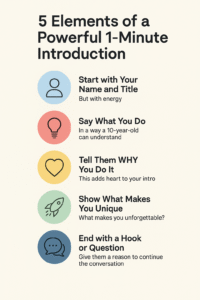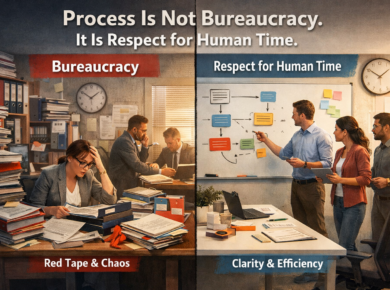The 1-Minute Introduction That Makes People Remember You Forever
Imagine you walk into a room, introduce yourself, and people remember your name, purpose, and energy long after you’re gone.
That’s the power of a 1-minute introduction done right.
Whether you’re at a business meeting, networking event, or job interview, how you introduce yourself can change everything. Most people waste this golden opportunity with boring, robotic lines like “Hi, I’m Ankit, and I work in operations.”
Let’s change that.
Why Your First 60 Seconds Matter
People form an impression of you within the first few seconds.
In fact, according to a Princeton study, it takes just one-tenth of a second to start judging someone’s trustworthiness.
So, here’s the good news: You can hack this impression.
And here’s the bad news: Most people don’t prepare for it.
Don’t be most people.
Note This Before You Meet Anyone
Take 5 minutes before any meeting or event to prepare your 1-minute intro.
Write it down. Practice it. Say it out loud.
Here’s what you should prepare:
-
Who you are (Name + role)
-
What you do (Clearly & simply)
-
Why you do it (Purpose or passion)
-
What makes you different (A quick twist or story)
-
How you can help (Or what you’re looking for)
Let’s dive deeper.
The 5 Elements of a Powerful 1-Minute Introduction
1. Start with Your Name and Title – But with Energy
Bad: “Hi, I’m Rina. I’m in marketing.”
Good: “Hi, I’m Rina, and I help brands turn boring content into million-dollar stories.”
Hack: Use active language and show value in your title.
2. Say What You Do in a Way a 10-Year-Old Can Understand
Bad: “I optimize business processes using Six Sigma frameworks.”
Good: “I help companies stop wasting time and money by fixing broken processes.”
Hack: Avoid jargon. Use benefits, not buzzwords.
3. Tell Them WHY You Do It
This adds heart to your intro.
Bad: “It’s my job.”
Good: “I once saw a factory lose a $1 million order because of a small error. That day, I knew I had to be in quality.”
✅ Storytelling tip: Share a brief, personal moment that connects your work to your values.
4. Show What Makes You Unique
What makes you unforgettable?
Bad: “I’m one of many consultants.”
Good: “I combine data science and psychology to design products people can’t stop using.”
Hack: Think of your unique combo—skills, hobbies, or experiences.
5. End with a Hook or Question
Give them a reason to continue the conversation.
Bad: “Thanks, that’s me.”
Good: “I’m currently helping startups double their growth—what’s your current business challenge?”
Hack: End with a call to engage or a thought-provoking question.
Real-Life Example (Story Time)
Let’s bring this to life with a story.
Ankit was once at a leadership conference filled with top executives.
Most people were doing the typical intros: job title, company name, handshake, next.
When his turn came, he said:
“Hi, I’m Ankit. I don’t just lead operations—I build machines that never miss a deadline. My journey began when a 10-second delay almost got me hit by a train at age 9. That day, I learned the cost of broken systems. Now, I help companies fix theirs.”
The room went silent. Then applause.
Later, five people from the audience came to connect with him.
Good vs. Bad: A Quick Recap
| Element | BAD Introduction | GOOD Introduction |
|---|---|---|
| Name & Role | “Hi, I’m Rohit, engineer.” | “I’m Rohit, I turn complex problems into simple, scalable systems.” |
| Value | “I manage projects.” | “I lead cross-functional teams that deliver on time and under budget.” |
| Passion | “It’s just work.” | “I love building what others say is impossible.” |
| Uniqueness | “I’ve worked in many industries.” | “I blend lean manufacturing and AI to drive growth.” |
| Closing | “That’s all.” | “What’s the biggest problem your team is facing right now?” |
Final Tips for Mastery
Note this down before every key meeting:
-
Your value in one line
-
A story or event that shaped your path
-
Your unique edge
-
A question to spark the next conversation
Practice out loud: Record yourself and listen.
Refine regularly: Update it based on where you’re going next in your career.
Conclusion: Make Every Minute Count
You only need one minute to become unforgettable.
But that one minute must be:
-
Clear
-
Human
-
Purpose-driven
-
Easy to remember
-
Prepared in advance
So before your next meeting, don’t wing it. Prepare your 1-minute pitch and watch how people lean in when you speak.










Comments are closed.